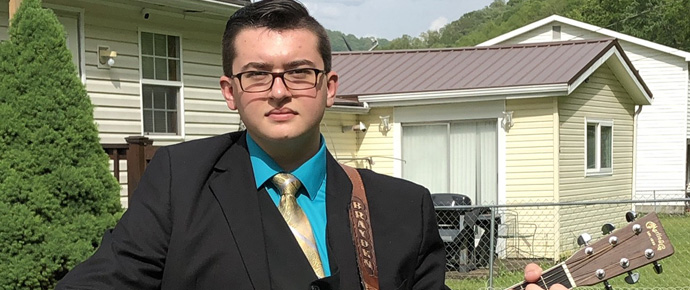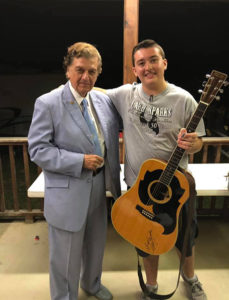
Watching the Grass Grow is a recent song written by the subject of this Young Uns feature, Brayden Williamson. In it he talks about the youth of bluegrass growing in the music, and how the pioneers of the music inspired them to do great things with the music, and inspire other Young Uns to keep the original style alive.
From Logan County, West Virginia, Brayden Williamson has only just celebrated his 17th birthday but, the singer and guitarist already has two Gospel albums and a Folk/Country album. 2019 has been a very busy year for him.
The area is rich in music history with Frank Hutchison and Dick Justice, two coal miners who worked in the county, being perhaps best known. However, genetically, of greater importance to Brayden Williamson are Okeh recording artists in the late 1920s, The Williamson Brothers; singer and guitarist Ervin Williamson being his grandfather.
The guitarist/bluegrass, Gospel and Country music singer has “always liked bluegrass”; at age eight he really started to appreciate the style and the sound, and what it took to do it right.
Additionally, Williamson has taught himself to play the mandolin to add fill-ins with his recordings, “I’ve picked around on it until I felt I was doing well.” Similarly, he plays some bass, just a “few times for some recordings I did.”
As well as being busy with recordings he has played at many venues, benefit shows, Gospel events, and services, mostly around the West Virginia and Kentucky area.
Williamson has been interviewed on air by David Pugh for his Mountain Bluegrass show, on World-Wide Bluegrass (September 2019) and earlier this month (November 2019) he recorded a spot on WSAZ Studio 3 in Huntington, West Virginia, to be broadcast on December 5, 2019.
He spends most of his evening time after school-working on music related projects, recordings, advertising his music, and dealing with bookings.
Were you born into a musical family? If so, what is the background, please?
My grandfather, Ervin Williamson, was very musically inclined, and he had made six recordings under the Okeh Record Company in 1927-29. He was featured in the PBS documentary, American Epic, and has a several page section about him in the American Epic companion book. There will soon be another book released that mentions his music in it. My grandfather was also the first to record the original John Henry song, and the end credits of the documentary state that he and my uncle composed the song (Gonna Die with a Hammer in my Hand).
He had my dad at a late age and passed in the 1970s. My mom and dad don’t play instruments, but my dad sung in church as a kid, though, and did very well.
My uncle and great uncle (dad’s brother and dad’s uncle) and many of my cousins are very musically inclined (guitar, mandolin and banjo) and have made home recordings.
My grandfather on my mother’s side played guitar and sang. So did my grandfather’s brother.
I believe that is why I have a passion to do what I do! I believe some of us are called to do this music. I believe this is my calling!
When did you became aware of music and what part did it play in your early life?
The first time I heard a Martin guitar was the first time I was turned to bluegrass music, in my elementary school music room. We had a music class when I was younger where our teacher, Mr. Robert Leete, would play his guitar and teach us folk songs with it.
The guitar had such a sound that I can remember it to this day. That’s what got me started on playing guitar.
I’ve had a guitar in my hand since I was two years old. Whether it be a little plastic one or a wooden beginner’s guitar when I was younger. I can remember Road Less Traveled coming to town and inviting me up on stage in church to play mandolin with them when I was eight years old.
I began really learning how to pick on a Stagg acoustic guitar when I was 10. Then a couple years after I got my first Martin guitar. I was 12 years old, and it was a DX1Kae Martin mom and dad got me for Christmas one year. That’s the guitar I learned how to pick mostly bluegrass on (I also began to go to different churches and local events within that time and play/sing).
Mom and dad got me my Martin D35 about two years ago. That’s around the time when I began to travel around and get paid to sing places. God really has blessed me in my young age through my music, to meet and sing/pick with great people that have helped me along the way.
Who have been your biggest influences?
The first time I can recall listening to a bluegrass song was when my dad played Don’t Neglect The Rose by Larry Sparks. I was around eight years old. I was also introduced to the music of Ralph Stanley, Flatt & Scruggs, Tony Rice (guitar), Ricky Skaggs, and the Primitive Quartet (Gospel bluegrass).
Mr. Sparks has been a big influence to me in music also. He probably is the biggest person I’ve taken an inspiration from.
Him and his awesome booking agent, Phyllis Rice, have helped me with a lot of things that I needed to know, or by just giving me advice. I give a lot of credit to them.
My mom and dad are really supportive of my music, and I can’t be more thankful for all they’ve done for me in promoting my music.
I am thankful for the blessings that God has given me in my youth to grow in my love of bluegrass and Gospel music.
You say that you play mandolin and guitar; how did your playing of those instruments progress? Did you have lessons?
I learned the chords from just watching people play that used to come to the house and church.
When it came to picking guitar breaks, I would just listen to it over and over until I felt I got it right.
Same with mandolin. I’ve watched a lot of Ricky Skaggs picking.
Thanks to YouTube when I was younger, I’ve been able to easily listen to any song and slow it down when I wanted!
So, how did you progress with your singing during that time?
I tried to model my singing after the people that were singing the songs that I was learning. It was just a matter of paying attention to the vocals of the artist that I was listening to.
I record myself when I learn a new song and keep recording it until I think it sounds good. Then I keep that cut and practice from it. As I improve my voice, I record it to keep in the groove of my vocal style.
In what ways are you developing your skills to ensure that you have your ‘own’ voice, both vocally and instrumentally?
Vocally, I try to sing as natural as possible the way I would talk, and just keep it my own way without trying to copy someone else’s voice. I want people to say, “that’s Brayden’s voice,” when I sing, so I try to just keep my voice true to my accent.
When I play guitar, it’s a combination of flat picking and cross picking (sometimes); I’ve taken a big inspiration from Larry Sparks’ style of picking, but I have made sure to keep my own sound original when I can. It’s all a matter of trying to do it the way the pioneers of picking did it, but putting your own twist to it. I also want people to know who it is when I’m playing my guitar; I want an identity sound. Every guitar picker has a different style even if they play a song note for note, in my opinion. I sometimes use blues licks in my breaks and sometimes a good ole “G” run and just branch a melody and add fill-ins that accompany the sound of the song. I am still very much learning and still have a long way to go before I have a set identity sound.
You have written a couple of songs; when did you start and what prompted you to do so, please? Who are your primary influences?
The first song I wrote is called Watching The Grass Grow; I wrote it thinking about the youth of bluegrass music and how they are taking inspiration from the legends/pioneers of the music, and making a life with it.
My main inspiration was just the thought of how my generation (the youth) is the generation that needs to take hold of bluegrass and keep the tradition going as strong as it has ever before.
In August 2019 Larry Sparks invited Williamson to be a special guest on his show at the Mountaineer Opry House Barboursville, West Virginia.
Supporting musicians in this live offering of Watching the Grass Grow are Michael Feagan (fiddle); Evan Wilson (mandolin); Jacob Wright (banjo), and Matthew Madden (bass).
Tell me about I Just Go to The Cross please.
I was sitting in class a couple months ago at my high school, and I was thinking about how great it would be to be able to write another song and it be a Gospel song!
I sing several that other artist have written, but to have done one for my own would be a blessing. So, I began to think of what Jesus really means to me; I thought about the cross. If it wasn’t for him going to the cross, we would not have an easy way to salvation. When he died on the cross, that opened up a way for people to become saved and heaven bound.
I sat and thought about the steps that it takes to become a Christian, and that’s where I began to write the chorus. The term “I just go to the cross” relates to when you kneel down and pray that you believe Jesus died on the cross for our sins. You’re not actually going to the cross, but in prayer you are.
Then I began to think about how great it must be when we get to Heaven, so I wrote a little about that too – “Knowing that One Sweet Day I’ll Meet my Savior There” is another line of it. When we get to Heaven, that is the first thing we want to do! Is meet the one who died for us.
I wanted to talk about my personal experience with the Lord, so I started a line of the song with, “One day in my bedroom I read this holy book, it mentioned of a faithful life and showed me what it took.” The words just came to me, andthat line talks about how you have to read the Bible to learn more about the man upstairs and how to be saved.
The rest of the song just fell right together, I wrote it in about 30 minutes all together; having to change some things up in it, of course, in the studio the next day. It has a guitar and mandolin instrumentation in it, with a soulful attitude. I honestly think it is my best poetry work I’ve ever written!
Have other songwriters inspired you to pen your own songs? Or influenced the way that you write?
I have not taken any inspiration from a certain songwriter while writing my song, Watching the Grass Grow. I did get that term ‘watching the grass grow’ from a great friend of mine that attended a summer cookout I had at my home. We began talking about how the youth of bluegrass is “growing” in the music, and really taken off with it.
To write the song consisted of me just writing down words and phrases that connected to the soul meaning that I wanted to broadcast with the song. The kids of bluegrass music are growing in the tradition, therefore, fans are (watching the “blue” GRASS grow).
It took me a solid month to get everything together for the song then to begin going into the studio and playing with different instrumental variations to make the song my style.
Tell me about your ambitions please.
My ambition all stems from the love I have for the music, the feel it gives me to hear and play it. My goal is to keep the tradition of bluegrass alive.
(A) Heart That Will Never Break Again, from Williamson’s Brayden Williamson Gospel Vol. 2, was written by Edd, James and Russell Lee Easter, and recorded by the Easter Brothers and Green Valley Quartet in 1984…..
This instrumental version of Wildwood Flower is also from Williamson’s guest appearance at the Mountaineer Opry House, supported by Larry Sparks and the Lonesome Ramblers ….
Sparks’ booking agent Phyllis Rice is full of praise for Williamson ..
“Brayden is the perfect example of what a young man and musician should be. The first time I met Brayden I asked him to come on Larry’s bus and meet Larry. He was very appreciative of that and thrilled him to death.
He helped Larry with his show in Barboursville, West Virginia. He worked and help put up posters for the show.
Brayden is very talented and a good entertainer.
His mother and dad, Raymond and Teresa, are good salt of the earth people also.
Just be yourself, Brayden, and hang in there; you are doing a great job.
We thank you for being a huge Larry Sparks fan!”
David Pugh remembers ….
“Brayden Williamson was just 16 years old, when he started listening in to my online radio show.
Brayden, a huge fan of Larry Sparks, e-mailed me to say he had been listening to my show. I had just interviewed Larry Sparks two weeks before getting his email. Brayden told me he had just written, and released, his first single. He wanted me to listen to it.
The song he sent was Watching The Grass Grow. I thought it sounded pretty good, so I put it on my playlist. The kid was elated to hear me play it. I do a Top 12 bluegrass chart, and countdown, every week. The requests started pouring in for Brayden’s song. His single has now been on the Top 12 for 11 weeks. Plus, it hit No. 1 two weeks ago, and it’s on fire in the bluegrass world.
I am proud of Brayden Williamson He’s a great young man, who loves God. He is multi-talented, and I think he will go far in his musical career. He has a brand-new Gospel single, that will debut on my show next Sunday night [December 1, 2019]. I know it’s going to do well for him.”
A Discography
Brayden Williamson
- Brayden Williamson Gospel 2019 (Brayden Williamson BW Recordings Llc, released 2019)
- Brayden Williamson Gospel Vol. 2 (BW Recordings Llc, 2019)
- Brayden Williamson Country Music Vol. 1 (BW Recordings Llc, 2019)
Singles
- Amazing Grace (BW Recordings Llc, May 2019)
- Pickin’ – (BW Recordings Llc, July 2019), aka Pickin’ is a Family Tradition; an instrumental dedicated to his grandfather, Ervin Williamson.
- Watching the Grass Grow (BW Recordings Llc 00001, September 1, 2019)
- I Just Go to The Cross (BW Recordings Llc, November 26, 2019)








